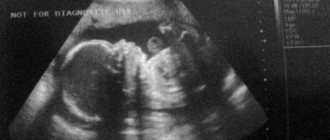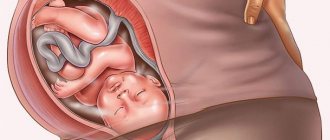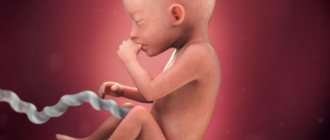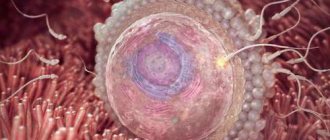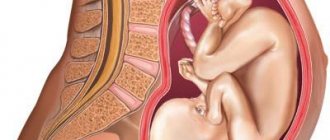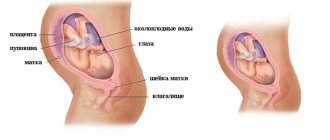The 37th week of pregnancy using the obstetric method is the period of active preparation for the birth of your baby. According to medical indicators, the child already has all the necessary reflexes and skills.
In the case of premature birth, the most important thing is to provide the baby with timely and high-quality medical care. What happens to the expectant mother during this final period of gestation? What are the sensations and emotions?
Pregnancy is almost over
Childbirth at 37 weeks of pregnancy
At the end of this week, the birth will no longer be considered premature, because the baby will already be ready to be born. So try to be as careful as possible this week. But even if you give birth in the coming days, the baby will have every chance to grow up absolutely healthy. It is believed that birth at 37 weeks is quite possible for multiparous women. If you are not expecting your first baby, be attentive to what is happening in your body and prepare yourself for the fact that at any moment you can go to the maternity hospital.
Recommendations for mom
- Collect bags with all the necessary things according to the list that you will be given at the maternity hospital. All these things must be packed and in an accessible place. All your family and friends should know what is in the packages, what they are for and where they are.
- Sort all items according to the principle “this is for the delivery room, this is for the ward”, “this is for mother, this is for baby”, “this is clothing, these are hygiene products”. This will make your stay in the hospital much easier.
- Be attentive to any changes in your body, and if you have any doubts or suspicions, go to the doctor.
- Don't wait until your water breaks or contractions become excruciatingly painful; it's better to get to the delivery room early and wait than to go when labor has already begun.
- Try to rest more, eat well. Childbirth is an energy-consuming process, you will need a lot of strength.
- Learn the basics of pediatrics and the basics of breastfeeding. This knowledge will be useful to you immediately after the baby is born.
- Try not to worry no matter what. The calmer you are, the more positive your attitude, the easier the last weeks of pregnancy and childbirth will be.
Changes in the body of the expectant mother
What could have changed in the last week? For example, your stomach might drop. This usually happens from about 36 to 38 weeks, but it also happens that it does not go down at all. If your tummy sank, you felt relief, being able to breathe in deeply. Shortness of breath can also be forgotten, heartburn will no longer torment you. But at the same time, now the pressure on the bladder has become even greater, which means that you will go to the toilet more often.
37th week of pregnancy: belly
When the stomach feels tight at 37 weeks of pregnancy, any woman can begin to worry, especially if she is about to give birth for the first time. What if this foreshadows the upcoming birth? Let's try to figure out the reasons for such feelings.
When a pregnant woman walks for quite a long time, be it shopping or just walking, the stomach can pull due to the fact that the muscles of the uterus are tense. For some women, such sensations can even be a little painful. If this happens to you, look for an opportunity to sit down somewhere so that your uterus relaxes.
Discharge at 37 weeks of pregnancy
Most likely, even without any recommendations, a pregnant woman monitors the nature of her discharge, because during this period women carefully monitor what is happening to their body. Therefore, the expectant mother knows what discharge is considered normal: colorless or milky, odorless, uniform in consistency. In the last weeks of pregnancy, you can observe a small amount of mucus in them, which indicates the beginning of the mucus plug. It also happens that it comes out completely. And you should know that this is one of the harbingers of childbirth. Women who give birth again need to be especially careful about this, because their labor process may begin in the near future after the mucus plug comes out. By the way, it may also happen that the plug will come off in the maternity hospital, at the moment when you start giving birth.
Certain discharges should alert you. Curd-like white discharge is characteristic of candidiasis (thrush), often accompanied by itching. It is important to treat them before birth, because the baby, passing through the birth canal, “collects” your microflora. And he will not tolerate thrush as easily as you, because his immunity is still weaker.
When the discharge begins to smell unpleasant and changes its color to grayish or green, the doctor will suspect that you have some kind of inflammatory process. It also needs to be cured so that it does not affect the health of your baby.
It is necessary to urgently call an ambulance when you find blood in your discharge. This may indicate placental abruption, and a high percentage of abruption is extremely dangerous for your life.
Movements at 37 weeks of pregnancy
You still need to record all your baby's movements somewhere. Now there should be at least 10 of them during the day. If their number decreases or increases, be sure to tell your doctor. You should know that just before birth, the baby may “calm down.”
Pain at 37 weeks of pregnancy
Painful sensations at 37 weeks can be very different. The back may hurt due to a shift in the center of gravity and increased stress in the form of a tummy. Heaviness appears in your legs, and if you also have varicose veins, then pain in your legs will become a common occurrence for you. In order to alleviate your condition, be sure to rest during the day. You can sit with your back on pillows and your feet on a raised surface, which will help reduce some of the swelling. Taking a horizontal position will also be very useful for you, because in this way the back muscles will be relaxed.
Abdominal pain may occur from time to time due to sprained ligaments. Also quite noticeable are changes in the pelvic bone apparatus in connection with the body’s preparation for childbirth. The baby's kicks are also painful, especially if he hits the liver or ribs with his leg. And since it has already descended to the entrance to the pelvis, the pressure on the cervix can be very uncomfortable.
You are already tired of heavy workload, constant fatigue and pain. But after some time you will have to give birth to your baby, and all the pain will have to be left behind.
Sex at 37 weeks pregnant
Pregnancy leaves a certain imprint on a couple’s family relationships. At the same time, doctors do not prohibit intimacy, but in this case several rules must be followed. The expectant mother should be comfortable in the position chosen by the partners, and any impact on the stomach should be avoided. In the last stages, frequent intimacy can contribute to the onset of labor, because during orgasm, the muscles of the uterus begin to contract, so you need to be careful with this.
However, not every pregnancy proceeds without difficulties, and gynecologists in this case recommend giving up sexual relations so that the desire for pleasure does not bring any harm to the baby’s life.
Mom's lifestyle
Starting from the 37th week, the mother needs to be very careful and attentive. Even when going out to the store, you should have your passport, exchange card and phone with you. You need to try to protect yourself from stress and fatigue, and get more rest. It is better to avoid low bends (to pick something up from the floor, for example) by asking someone nearby for help.
Diet
Diet recommendations remain the same. Mom should follow the diet that the doctor recommended to her. You should not overeat, it is better to eat 5, 6, 7 times a day, but in small portions. You should definitely exclude from your diet any allergenic foods (citrus fruits, nuts) and foods that are difficult to digest.
Don't forget about liquid. You can and should drink water, weak tea, dried fruit compote, homemade fresh juices.
Skin care
There is no need to change anything in skin care. If you used a moisturizer for your belly skin, continue. Moisturized skin is less susceptible to stretching, this will reduce the number of stretch marks after childbirth, and even those will go away quickly. Use hypoallergenic skin care products for your entire body and hair. Be careful that the soap or gel does not dry out the skin.
Sex at 37 weeks pregnant
Many modern specialists allow sex, right up to childbirth, if there are no contraindications. This is even useful, since prostaglandins, which are found in male sperm, help prepare the cervix for labor. However, some care must be taken when choosing positions without putting pressure on the abdomen.
If there are signs of the mucus plug coming out, you will have to say a firm “no” to sex, since the risk of infection of the membranes increases. Even if both partners are completely healthy.
Necessary studies and analyzes
If you have a doctor's appointment this week, be sure to take a urine test first. If before this you had a decrease in hemoglobin, then a blood test could also be prescribed for you. These are the two most common tests that a woman has to undergo during pregnancy.
During your appointment, the gynecologist will ask you about your health and be sure to check how much your body weight, the height of the uterine fundus and abdominal circumference have changed. It is also necessary to listen to the fetal heart beat. They will also measure your blood pressure, because towards the end of pregnancy doctors pay very close attention to weight gain and blood pressure readings of a pregnant woman so as not to miss the appearance of the first signs of gestosis.
Perineal massage during pregnancy
Are you anxiously awaiting the arrival of your “birth day”? So don't sit idly by and try perineal massage! Believe me, there are many good reasons for such strange, in the opinion of many, advice. It is helpful to know that this procedure helps to gently stretch the area of skin between the vagina and rectum, which in turn will minimize pain, tearing and episiotomy when passing the baby's head during labor. Here's how to properly massage your mother's path:
1. First, make sure your hands (or your spouse's hands, if he takes on this task) are clean and your nails are trimmed. Then you should lubricate your fingers with gel and place them in the vagina.
2. Then press down toward your rectum and move your fingers toward the bottom and sides of your perineum, gently stretching the lower part of your vagina back and forth. This will stretch the skin and make it easier for your baby's head to pass through during labor.
3. It is not necessary to do this procedure every day, and it is not at all worth it if your supervising doctor suggests doing it yourself, or if you do not feel comfortable doing it.
Possible problems
Not every pregnant woman experiences swelling at the beginning of the third trimester. But edema at 37 weeks of pregnancy is more than likely, since the circulatory, urinary and other systems, adapting to changes in the body of the expectant mother, work a little differently. In order not to miss the development of gestosis, pay close attention to the appearance of swelling. You need to monitor your weight gain, and it is advisable to measure your blood pressure regularly (daily). It is swelling, increased pressure, as well as the presence of protein in the results of a urine test that are signs of gestosis. If this symptom complex further develops, you may require emergency delivery. Be careful.
To reduce the development of edema, you can avoid salty foods, compensating for the taste of food with spices. You also need to slightly reduce the amount of liquid you drink. And don’t forget to rest during the day with your legs elevated, which will improve blood flow from them and, accordingly, reduce swelling.
Possible deviations from the norm
There are a number of deviations from the norm that you need to be prepared for and respond to emerging problems at the slightest sign:
- Lack of calcium and vitamin D. The baby does not ask how much calcium you have in your body, he simply takes it in the required amount. This puts you at risk of seizures, varicose veins and hemorrhoids. If the mother lacks vitamin D, the baby may develop rickets after childbirth.
- Exceeding the permissible weight limits. Now this is dangerous not only for the mother, who after childbirth is at risk of metabolic syndrome and type 2 diabetes. Now this threatens the baby with excess fat. Large children are more likely to be injured during childbirth, simultaneously tearing the mother's birth canal.
- —Preeclampsia—. Along with increased blood pressure, swelling and the appearance of protein in the urine, it is a harbinger of eclampsia.
- Eclampsia. It is the most serious complication of all pregnancy and is the cause of maternal mortality worldwide. The danger is that the causes of eclampsia are not clear, so it cannot be prevented.
Recommendations
To spend the remaining weeks in a good mood and without unnecessary problems, follow the following recommendations:
- Don't worry about your upcoming birth. So many women have already gone through this that doctors have accumulated vast experience in this matter. In addition, if you have a low pain threshold, there are different ways to ease the pain of a woman in labor, which you can talk about with your doctor in advance.
- Be careful when walking. Avoid accidental collisions with passers-by, and in winter, walk carefully so as not to fall.
- Avoid traveling during this period. And when you go for a walk, don’t go too far from home so that you can quickly walk back at any time.
- Be prepared to go to the maternity hospital at any time , so a bag with the necessary things and documents should be in a visible place.
- Try to avoid stressful situations , and to do this, find ways to calmly spend time and relax. Listen to music, sing, read. Ask your loved ones to help you with household chores if they are able to do so.
- Ensure yourself a good night's sleep , despite the fact that insomnia may be overwhelming you lately. Avoid late meals, ventilate your bedroom, and take a walk in the evening. Before going to bed, ask your husband to give you a light back massage, listen to relaxing music. Don't deprive yourself of the opportunity to get enough sleep, because soon you will have sleepless nights.
Preparing for childbirth, harbingers
Despite the fact that the allotted period is 9 months, it is possible that already at 37 weeks you may experience “premature labor.” This is not scary, the baby is mature enough for life outside of you, but you need to react to it correctly.
Preparation
First of all, you must decide on the birth. Who do you want to give birth with - with “your” paid doctor and his team, or an on-duty team will suffice. Once this issue is resolved, the next step is to list your things. The doctor leading you gives you a list that is “characteristic” specifically for the conditions of your maternity hospital. We will provide only an indicative list of everything needed.
Documentation:
- Passport;
- Exchange card;
- Referral from antenatal clinic.
Items in the delivery room:
- Water;
- Clothes and shoes for the husband (if the birth is partnered);
- Diapers;
- Paper towels;
- Adult diaper;
- A set of clothes for the baby (vest, rompers, hat, mittens, blanket, diaper);
- Soft towel;
- Umbilical cord clamp.
Items for the postpartum ward:
- Nightgown (loose, with easy access to the chest);
- Comfortable clothes, underwear;
- Socks and slippers;
- Phone and charger;
- Personal hygiene products;
- Baby cream;
- Postpartum bandage;
- Dishes;
- Towel;
- Baby diapers and wet wipes;
- Diapers.
Items to be checked out:
- clothes for the baby according to the season;
- baby envelope;
- clothes for mom according to the season;
- comfortable shoes.
This is only an indicative list; each maternity hospital has its own requirements for mother’s “combat kit”.
Harbingers
For multiparous mothers, understanding that they are giving birth is not a problem at all - they have gone through it, these sensations cannot be confused with anything and will not be forgotten soon. True, most often the “symptoms” of the onset of labor in young ladies “with experience” proceed faster than in their “colleagues” who have not yet given birth. But if this is your first time, it’s worth reading about the warning signs once again; your timely arrival at the maternity hospital and the success of all births depend on this:
- If you have twins, you will give birth prematurely, prepare for this.
- Sudden diarrhea despite the fact that you haven’t eaten “anything like that” at 37 weeks of pregnancy is also considered a signal for the imminent onset of labor.
- If your plug (a small mucous clot, transparent, whitish or slightly reddish in color) has come off, this is a sign that labor is imminent. For some, it goes away 12 hours before birth, for others - a week.
- If, at 37 weeks of pregnancy, your stomach often and noticeably becomes stiff, the lower abdomen and lower back pull (like pain during menstruation) - wait. As soon as the pause between these contractions becomes approximately the same (about 15-20 minutes), you can begin to move towards the maternity hospital.
- If your waters break (about 0.5-1 liters of clear liquid pour out of you), you should not move to the maternity hospital, but hurry, this means the beginning of immediate labor.
- If the water leaks little by little, go to the hospital immediately. Either they are slowly leaving, or it is a placental abruption. Only a doctor will figure it out, but the second case is dangerous for the baby.
If you have the slightest doubt, unusual sensations, or bloody discharge, go to the hospital immediately.

